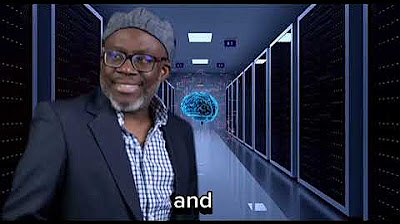AI Unveiled beyond the buzz episode 1
Summary
TLDRThis episode of 'AI Unveiled: Beyond The Buzz' explores the intriguing and misunderstood world of artificial intelligence (AI). Host Okichi clarifies AI as a sophisticated tool, not a Hollywood villain, and traces its evolution from the 1950s to modern times. The script delves into AI's transformative impact on various industries, ethical considerations, and the philosophical question of machine consciousness. It highlights key milestones like the Dartmouth Conference, the creation of Eliza, and IBM's Deep Blue, leading to today's AI integration in daily life and pondering the future of AI, including the challenges and potential of artificial general intelligence (AGI).
Takeaways
- 🧠 Artificial Intelligence (AI) is a sophisticated tool designed to perform tasks requiring human intelligence, such as understanding natural language and problem-solving.
- 👥 AI does not possess consciousness, emotions, or the ability to enjoy experiences as humans do; it is a mimic and performer without the actual experience.
- 🚀 AI is transforming various industries and everyday life, despite ethical considerations and potential for misuse, reflecting its powerful and dual-edged nature.
- 🤖 The concept of AI was born in the 1950s, with the Dartmouth Conference marking its official inception and the term 'artificial intelligence' being coined.
- 💡 Pioneers like John McCarthy, Alan Turing, Marvin Minsky, and Allen Newell laid the groundwork for AI, envisioning machines that could learn, reason, and understand human language.
- 🧩 The 1960s saw optimism and excitement about AI's potential, with the creation of ELIZA, the first AI chatbot, capturing public imagination.
- ❄️ The 1970s and 1980s, known as the 'AI Winter,' were marked by disillusionment and a decline in funding and interest due to the gap between expectations and capabilities.
- 🌟 The 1990s and 2000s witnessed a resurgence of AI, with advancements like IBM's Deep Blue and Watson demonstrating AI's ability to excel in complex problem-solving and natural language understanding.
- 🌐 The rise of the internet and technology advancements in the 1990s and 2000s brought AI into mainstream life, integrating it into daily routines and various industries.
- 🔮 The future of AI holds the promise of artificial general intelligence (AGI), which could potentially match or surpass human intelligence, but it also presents challenges and ethical considerations.
- 🌱 The journey of AI from its inception to the present reflects human ingenuity and perseverance, with the potential to shape a better, more equitable future if developed responsibly.
Q & A
What is the main theme of the video 'AI Unveiled: Beyond The Buzz'?
-The main theme of the video is to explore the concept of artificial intelligence (AI), its history, evolution, and impact on society, as well as the philosophical and ethical questions it raises.
Who is the host of the video 'AI Unveiled: Beyond The Buzz'?
-The host of the video is Okichi, who guides the viewers through the journey of AI.
What is the purpose of AI according to the video?
-The purpose of AI, as presented in the video, is to perform tasks that usually require human intelligence, such as understanding natural language, recognizing patterns, solving problems, and making decisions.
How does the video describe the early perception of AI in Hollywood?
-The video describes the early Hollywood perception of AI as a malevolent force, often depicted as a robot plotting human downfall, which is contrary to its actual nature as a sophisticated tool.
What significant event marked the birth of AI in the 1950s?
-The Dartmouth Conference in the summer of 1956 marked the birth of AI, where the term 'artificial intelligence' was coined.
Who are some of the pioneers mentioned in the video that contributed to the early development of AI?
-Some of the pioneers mentioned in the video include John McCarthy, often referred to as the father of AI, Alan Turing, Marvin Minsky, and Allen Newell.
What was the public's reaction to the first AI chatbot named ELIZA?
-The public was captivated and fascinated by ELIZA, sparking a widespread interest in AI and the idea of engaging in conversation with a machine.
What challenges did AI face during the 1970s and 1980s, often referred to as the 'AI winter'?
-During the 'AI winter', AI faced skepticism, disillusionment, and a significant decline in funding and interest due to the complexity of real-world problems exceeding the capabilities of the AI systems at the time, which were brittle and inflexible.
How did the advancements in technology during the 1990s and 2000s contribute to the resurgence of AI?
-The rise of the internet and rapid advancements in technology during the 1990s and 2000s allowed AI to move from a conceptual phase to a more practical one, integrating into daily life and demonstrating its potential in solving complex problems.
What are some of the ethical considerations and potential pitfalls of AI mentioned in the video?
-Some ethical considerations and potential pitfalls of AI mentioned in the video include the risk of job displacement due to automation, concerns about privacy, and the potential for misuse or unintended consequences.
What is the vision for the future of AI as discussed in the video?
-The vision for the future of AI includes the development of artificial general intelligence (AGI) that could potentially match or surpass human intelligence, while also emphasizing the need for responsible development that benefits all of humanity.
Outlines

This section is available to paid users only. Please upgrade to access this part.
Upgrade NowMindmap

This section is available to paid users only. Please upgrade to access this part.
Upgrade NowKeywords

This section is available to paid users only. Please upgrade to access this part.
Upgrade NowHighlights

This section is available to paid users only. Please upgrade to access this part.
Upgrade NowTranscripts

This section is available to paid users only. Please upgrade to access this part.
Upgrade NowBrowse More Related Video
5.0 / 5 (0 votes)





